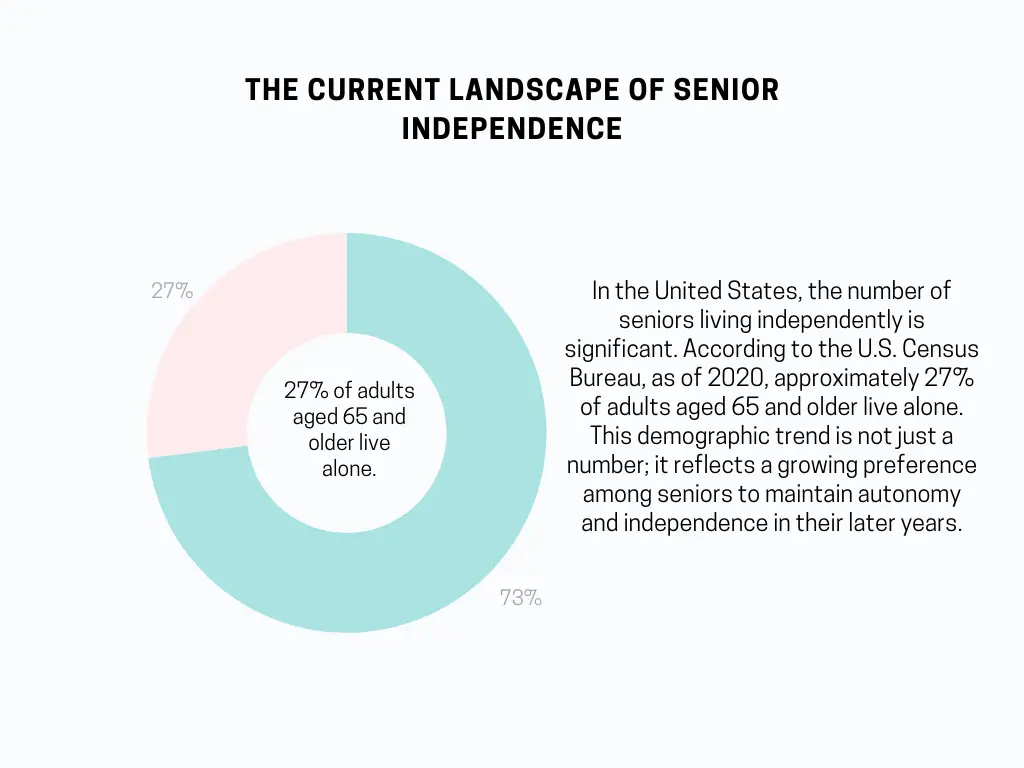In today’s rapidly aging society, the topic of seniors living independently is gaining increasing attention. With a significant portion of the population entering their golden years, understanding how long seniors can live independently is not just a matter of personal relevance but a societal concern. Today, we’ll light on the latest statistics to answer a pivotal question: “How much longer can a senior live independently?”
The Current Landscape of Senior Independence
In the United States, the number of seniors living independently is significant. According to the U.S. Census Bureau, as of 2020, approximately 27% of adults aged 65 and older live alone. This demographic trend is not just a number; it reflects a growing preference among seniors to maintain autonomy and independence in their later years.

Understanding the Numbers
But what do these statistics really mean? Living independently as a senior comes with its challenges and rewards. The Administration for Community Living reports that while many seniors enjoy the freedom and comfort of their own homes, others face difficulties related to health, mobility, and social isolation.
Industry Statistics: A Closer Look
The senior living industry, aware of these challenges, is evolving. A report from the National Center for Assisted Living shows a rise in the number of assisted living communities, catering to seniors who require some level of support while still promoting independence. However, the preference for staying at home remains strong. In fact, the American Association of Retired Persons (AARP) concluded that nearly 90% of seniors wish to stay in their homes as they age.
The Duration of Independence
So, how long can seniors realistically expect to live independently? The answer varies widely based on several factors, including health, social support, and accessibility of services. A study by the National Institute on Aging indicates that seniors with strong social networks and access to health care services tend to live independently longer. Conversely, those with chronic health conditions or limited mobility may face earlier transitions to assisted living or care facilities.
The Centers for Disease Control and Prevention (CDC) adds that the average senior, in good health, can live independently well into their late 70s or early 80s. However, this is a general estimate and can differ greatly from individual to individual.
Implications for the Future
As our population ages, these statistics carry significant implications. They suggest a need for more accessible healthcare services, increased social support networks, and housing options that cater to the diverse needs of seniors. Moreover, they highlight the importance of planning for senior care, both at the individual and policy levels.
Conclusion
The ability of a senior to live independently depends on a complex interplay of health, social support, and access to services. While many can enjoy their autonomy well into their later years, it’s crucial for both seniors and society to prepare for the eventual need for additional support.
As we continue to support our seniors, it’s essential to remember the value they bring to our communities and the importance of enabling them to live with dignity and independence for as long as possible.

Morgan Elfman is a compassionate writer, dedicated caregiver, and passionate advocate for senior well-being. Born and raised with a deep sense of empathy and a natural inclination towards service, Morgan has devoted her life to making a positive impact on the lives of seniors.
As a writer for www.choiceseniorlife.com, Morgan utilizes his skills to create insightful and informative content that addresses the unique needs and challenges faced by seniors and their families. Her articles not only provide valuable information on health, lifestyle, and care options but also strive to inspire and empower seniors to lead fulfilling lives.
